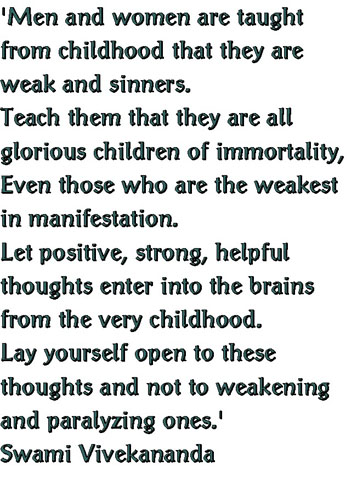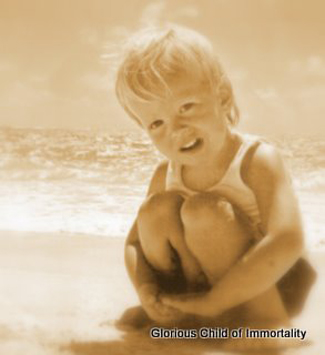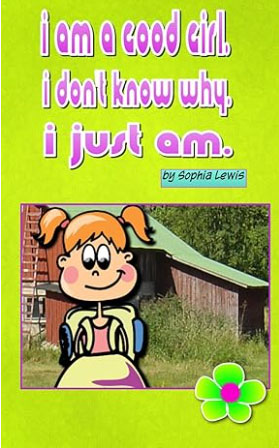Parenting with Conscious Speech
Prayers, Affirmations, Quotes, Songs
to Lift Your Child's Spirit!

Conscious Speech

In the commitment to parenting consciously, practicing conscious speech is fundamental. Our intention is to not pass on limiting messages that stand in the way of our child's empowerment and even destiny. We understand that the vibration of the words we speak with and to our children has a huge influence on their self-esteem, well-being, and self-actualization.
'Thoughts are things....' 'Words have power....' How many times have we heard phrases to that affect? And yet, do we forget sometimes to consider what that really means, or even, as spiritual, six-sensory beings connect with what that really feels like to us? This awareness is essential to parenting with conscious speech.
We decorate our homes...we style our hair...we accessorize our outfits--in ways that are aesthetically pleasing to ourselves and others. It is thus appropriate to consider consciously how we 'decorate' our speech. When parenting with conscious speech, do we take notice of how our conversation impacts the energy frequency of our home?
For some of us it is important to also ask ourselves, are harmonious sounds the major player in our homes, or, for example, do the dissonant sounds from that "box" in the corner of the living room predominate? (Yeesh, turn that noise off!)
The Energy of Words
The words we speak and hear have a vibration, an energy. Remember the time someone told you that they loved you deeply. You could feel your whole being vibrate to a higher frequency...it gave you a buzz, yes? My sister called me this morning and left a message on my voice mail saying "just called to say 'hi and I love you!'" Awwww...I stepped more lightly, no---I danced (!), through the rest of the day!!

Then (very briefly--don't linger here!!), consider the time that someone told you they liked your new voice mail message, continuing with how they just couldn't in all seriousness understand why you kept the old boring, unauthentic, 'so-not-you' one so long. Ohhhhh, compliment with a barb. You noticed, even while you smiled and deflected the comment with a chuckle and joking retort, the 'ouch' sensation in the gut.
And, of course, there have been other more destructive criticisms directed at each one of us that we have worked to forgive and release. But the point is, we have probably all experienced how the energy is drained from our solar plexus area where we tend to feel the 'sinking' sensation if we allow these words to affect us. (Our children are often more vulnerable to hurting words, and we can help them use tools to offset their potential impact--more on that later.) But this helpful exercise illustrates to us the importance of practicing conscious speech in our parenting.
The Feeling Effect of Words
But back to the feeling-effect of words...just as I was collecting my thoughts to write this page on conscious speech, I was given a very potent illustration (the Universe provides!).
My kids were with me in the family room quietly doing their schooling and my son started his English assignment for the day. It began with a reading of Robert Frost's poem, 'The Road Not Taken'...read more about our experience on reading poetry aloud.
It is easy to intellectually acknowledge the 'thoughts are things', 'words have power'...shall I say it?...cliches. But this was a valuable example just when I was addressing the topic of conscious speech. We've heard it so often: speak positive, uplifting words to ourselves and others. And we have experienced the benefits.
Yet, sometimes we may dismiss the reality of it and unconsciously slip into speech patterns that disable ourselves and others. However..., if we pay attention to our sixth sense, we'll clearly feel which words don't feel so good and thus pay closer attention to our self-talk and to the words we speak to our children.
Avoid This Debilitating Phrase

Many years ago I listened to one of John Gray's audiotapes and hear him talk about the use of the phrase, "I'm sorry". It has been a long time since then so I can't accurately quote his discourse, but what I took away from it and what has informed how I've guided my children is how the use of this phrase is so debilitating. Saying 'I'm sorry' is in effect saying 'I am pitiful, I am to be pitied'. One of Webster's definitions for sorry is 'worthless or inferior, paltry; a sorry excuse. Another definition is 'causing sorrow, grief, or misfortune; grievous'. If I say I am sorry than I am asking you to feel sorrow for me, pity me. Instead, using the phrase 'I apologize' acknowledges that a mistake has been made without saying anything about my 'I am-ness'.
When we insist that our children say 'I am sorry', we are instilling in them the message that they are inferior because the vibration of these words resonates with that message.Using conscious speech in our parenting influences what we teach our children, both by modeling and by our instruction.
When my kids instinctively say 'I'm sorry' (maybe because this is what they hear everyone else say?), I tell them 'NO, you are not. If you were I would pity you, I would have sorrow because of you...I do not feel this way'. I then encourage them to replace the statement with 'I apologize'. Going through this exercise when these occasions arise is over time helping them to remember to choose the more empowering statement which acknowledges their responsibility for their actions, words, etc., and empowers them to make a different choice the next time.
(As an aside, just recently I had a discussion with my two youngest regarding their continuing to use the phrase 'I'm sorry' at times. I suggested maybe it was because they like to hear from me my little spiel of 'no, you're not sorry, you're awesome...' My son replied, 'That's exactly it!')
Eckhart Tolle, in his book 'New Earth', discusses 'I-amness'. He says... "The ultimate truth of who you are is not I am this or I am that, but 'I Am.'" 'I am sorry' is a false identity. Perhaps helping your child make the transition away from this disempowering statement would be to suggest they say 'I feel sorry'.
Try saying 'I'm sorry' and then 'I apologize' right now, out loud, if you'd like and are able to (if you're on the subway or in the library, you may want to wait!).
Can't you just feel the difference in energy? One makes you feel remorseful, guilty, or less worthy--a sinking sensation, perhaps. The other makes you feel like yes, I own this and yes, I can do differently next time.

Positive Behavior Correction
Speaking of next time... when your child exhibits behavior less than savory, when parenting with conscious speech, instead of chastising them for this time, we choose to suggest that "next time" they behave in a more positive manner which we describe to our child. For example, when they spill something because of haste, instead of coming down on them negatively this time for their actions, pointing out 'you were going too quickly, you need to slow down, you're being irresponsible, you always take shortcuts, you should..., etc., etc.' suggest that "next time" they go a little more slowly. They don't need to be made to feel guilty for what has just occurred, they need to receive positive, constructive instruction for next time.
Seriously, of what value is it to remonstrate with them for what has already happened? That part of the movie us over! Parenting consciously guides us to recognize and remember that we create what is to come with our being present. And in so doing we effortlessly use conscious speech.
Below, I share with you some goodies that have assisted us in creating a playful, lighthearted, uplifted environment to hang out in.
Every morning after asking that I be consciously connected with Higher Wisdom, I use the following prayer for myself and each of my children: Morning Prayer for you and your child.
Several years ago I read this saying in one of Wayne Dyer's books, made a little mini-poster of it, and affixed it to the refrigerator with a sturdy magnet. How to start each day expecting miracles! Good Morning! This is God.
When my daughter was born, I sent out this birth announcement: Birth Announcement celebrating the Magnificence of your Newborn!
These are from my collection of quotes that have made their appearance from time to time around the house: in the kitchen, on the refrigerator, on the bathroom mirror, on the chalkboard, spoken, in the car, on the filing cabinet, etc., etc. Take a look and see if you find just what you are looking for on this very day--the Universe works in mysterious ways, you know?!! Quotes that inspire parenting with conscious speech--You'll Love to Post these Reminders that Life is Beautiful!
I love the poem, "Mud Puddles"! It always reminds me to 'see with the eyes of a little child'. They teach us to rush headlong into life, on tiptoes, with awe and enthusiasm! Visit here for--Big Mud Puddles! Children teach us how to live life with abandon!
As an Amazon Associate I earn from qualifying purchases. These are genuine personal recommendations from my own practice.
My Sacred Tools
These are the cherished decks that guide my quiet time reflections. Each one brings unique wisdom—timeless archetypes, animal spirits, planetary herbs, and classic tarot symbolism. They’ve deepened my spiritual insights immensely, and I warmly recommend them if you're seeking gentle encouragement on your own path.
|
The Rider Tarot Deck®: The Authentic Rider-Waite® Tarot Deck A timeless classic that grounds my readings in rich symbolism and tradition. Its imagery speaks clearly and profoundly every time. |
The Wild Unknown Archetypes Deck and Guidebook This evocative deck dives deep into universal archetypes and shadow work. The artwork and guidebook inspire profound self-discovery. |
|
The Herbal Astrology Pocket Oracle A beautiful blend of plant medicine and planetary energies—perfect for nature-connected guidance. Compact and magical for daily draws. |
Medicine Cards: The Discovery of Power Through the Ways of Animals Animal wisdom at its finest. These cards teach power, healing, and lessons from the natural world with gentle, transformative insight. |
Get these books for free on Kindle Unlimited:
 Grandma's Recipes Go Gluten-Free "I am eating the Cranberry Muffins as I type this. YUM!! I used Organic Cranberry Sauce and Camino Muscovado Brown Sugar. Absolutely Delish! Looking forward to trying more of the recipes!" Amazon review |
 i am a good girl, i don't know why, i just am "This is a sweet short read of self affirmation and unconditional love and appreciation for the human spirit brought to this planet in the form of a perfect undeniably good little girl." Amazon review |
back to top of page
Site updated January 3, 2026




Comments
Thanks for reading! Have your say in the comments box below...